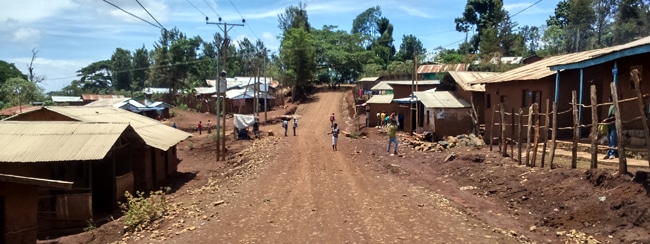
Picture: Sasiga (Ethiopia)
We do an interview with our partner Mónica Colmena, Head of Mission of FPSC in Ethiopia, to get to know better this African country and the projects FPSC is currently developing on it.
 Mónica, you have been our partner during several years in FPSC Headquarters and you decided to make a change in your professional career and work on site. What did motivate you to make that leap?
Mónica, you have been our partner during several years in FPSC Headquarters and you decided to make a change in your professional career and work on site. What did motivate you to make that leap?
Mónica Colmena: There was nothing specific that motivated me. I had always wanted to work on site, always had kept it on my mind, but very frequently our personal situations and life take us from other ways. Both my family and partners knew about it, because I had always talked about it. So, when I had the chance because the draft had been approved, the first one to think about was me. Thus, I applied to move to there, not only to work on site, but also because I thought Ethiopia was a really interesting country, and I fit quite much in the agroforestry project. I was feeling to live that change.
You are a woman who has a family, young children. What has meant a problem or what has been more difficult for you when taking this decision?
MC: When you are alone and decide on your own it is much easier to take the plunge. In my case, having young children being 4 and 1 years old –actually at that moment she was 6 months- the most relevant topic was the health issue. Ethiopia has great disadvantages for children in the developmental level, as they don’t have the same commodities as in Spain. But, at the same time, that means really different life learning for them, something really good that takes them out from the bubble of a developed country. They are still quite young, but all that leaves a mark on them. Martín, who is only 4, is starting to ask many questions, not taking everything for granted. In that sense, weighting up what was worth it, and despite it’s a great effort for them, I have always thought this was good for them.
Imagine you are back in the time when you have taken the decision and arrive to Ethiopia. Could you talk a little bit about your impressions about the country and its people?
MC: I had previously made an incursion alone in order to try to solve the logistical issue. That first time was really complicated to me, but I didn’t expect a second time with my family would also be that hard. If you find yourself alone trying to adapt to a certain place, it is just you and yourself; but, when your family is close to you, you suffer much more for all of them. It was a difficult moment, being quite hard for us. Also, the logistical issue is much more complicated when being with children, but having a couple and being excited about starting from zero helps too much.
We have settled down in Addis Abeba due to our agroforestry project in Nekemte, but the idea is to find new needs in the field. It’s great being in Addis Abeba, it is so useful; but, at the same time, it is a somehow mean city. Ethiopia is a really bureaucratic country; it is like being in Spain 50 years ago. Bureaucracy is exhausting; it takes a really long time to do any single process. You are not used to that. But that’s ok; you must change your mind and be aware about where you are and the reason why. You think when you arrive to the capital city of Ethiopia there won’t be many differences with Spain, but they are abysmal.
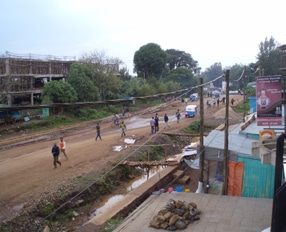
And, what about its people? What caught your attention?
MC: People is really kind. Cultural differences are great, but they are always so kind. People is especially nice with children, they respect them in such a way I have never seen in Spain. Talking about working, they follow a different rhythm. At the beginning is a little bit exasperating, as you follow your own deadlines and expect to have an answer. But there’s not. You must look for the equilibrium between the way you work and their way to do so; but being always quite respectful, trying to understand the others. It is not an easy process.
There are many differences between the areas in the country. What can you tell us to get an idea about how Ethiopia is?
MC: The country has very different areas; it is a really diverse country in all senses. The project is in Nekemte, 300 km far from Addis Abeba. Towards the West the area is especially green, with lots of mountains. They are the “highlands”, a wonderful place. The East and South parts are essentially desert, much more hostile. After two years of drought, there’s now an emergency situation in the place.
That’s El Niño phenomenon, isn’t it?
MC: El Niño phenomenon is yet to come. Until the moment, there have been several bad times with rains that have derived into droughts. But the phenomenon is soon going to be felt. The current situation is hard, but what is to come is scary, mostly in the East and South areas, where cattle are dying.
Do you have any information to quantify the current effects and emergency needs?
MC: Right now, there are people who are starving. The issue of cattle, who have died, is quite indicative. For example, in some really rough areas, donkeys are dying. That donkeys and dogs are dying means the situation is specially bleeding.
Moreover, you also told me in another moment there agriculture is the engine of the country.
MC: Yes, it is a really high percentage the one of citizens from Ethiopia who live off agriculture, mostly a subsistence one. This means they harvest after the rainy season, living with that they harvest the following months. After that, there are some moths of default when each one survives as he can until the following season comes and it is possible to harvest again. When harvest is bad, that default period is longer and then, you know, vulnerability is more clear. We are already feeling El Niño’s effect and the situation is brutal.
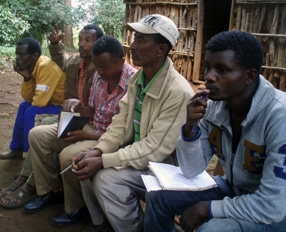 I would like to talk about the projects FPSC is developing in there. Tell us more about the project being developed in Nekemte, what is it about, the local partners you work with and your impression about the potential beneficiaries of that project: what do they know about us, what do they expect, or what is your relation with them.
I would like to talk about the projects FPSC is developing in there. Tell us more about the project being developed in Nekemte, what is it about, the local partners you work with and your impression about the potential beneficiaries of that project: what do they know about us, what do they expect, or what is your relation with them.
MC: It is an agroforestry project with the main goal of improving agricultural productivity in the area of Nekemte. It basically looks for agricultural diversification, the improvement of irrigation systems and forest restoration, because one of the main problems in the country is the environmental degradation.
What surprised me the most when I arrived –and I didn’t know about- is how replanted with eucalyptus Ethiopia is. The eucalyptus is an allochtonous tree that has been quite well adapted to the country. But it is not native to there, as some decades ago they decided to plant it as a solution to the many demands of the population. It constitutes a specific function, as it is a tree that grows really quickly, so that they cut it to meet their needs for firewood or construction, they use it for several things. Being an overexploited country, it meant a solution, but I don’t really know to what extent eucalyptus was the more appropriate tree. Also, it is spread throughout the country.
The problem is pressure on the forest still exists; many times it is overexploited so there are soil losses, meaning the loss of it for harvest. The project deals with forest restoration with local trees. Beneficiaries from three different woredas (districts) -Diga, Guto Gida and Sasiga, quite close to Nekemte- have been chosen for the project.
The beneficiaries have been chosen and grouped into savings groups. They are not only savings groups, these saving groups manage the group’s resources: seeds, fertilizer, etc. to distribute them among their members. But it is not sunk costs, these resources are provided to them and the farmer gives them back, after some time, to the group.
These savings groups do also distribute their workloads. One of the main principles in cooperation is the beneficiary to be involved in the process, to receive us, to be there to welcome us, because if that doesn’t happen, the whole thing makes no sense. They are implied in all the different tasks, in irrigation for example; they are the ones in charge of indentifying the rivers from where water will be directed; with restoration happens the same, garden centres are being formed and they are the ones working on it. They feel the project is theirs.
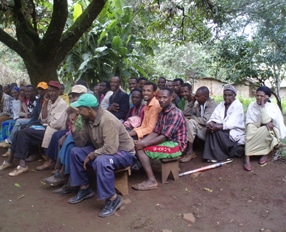 I have had the chance to be in some moments in any of the meetings of the working groups. At the beginning, it is difficult, because you break the harmony. You are there; they don’t really know quite well who you are, whether if you are a local partner or the donor. They don’t know who the different actors are. But it’s ok, they see you in there, taking pictures, asking and not speaking the language. Later they feel confident.
I have had the chance to be in some moments in any of the meetings of the working groups. At the beginning, it is difficult, because you break the harmony. You are there; they don’t really know quite well who you are, whether if you are a local partner or the donor. They don’t know who the different actors are. But it’s ok, they see you in there, taking pictures, asking and not speaking the language. Later they feel confident.
The limitation of the language is huge because Ethiopia is a country with several ethnic groups and languages. In rural areas, even in Addis, it is hard to deal with English. Really different languages are spoken in there. The most common ones are Oromo, Amharic and Tigrinya. They are very different. Language issue is really relevant, playing an essential role the local partner, the coordinator of the project in the partner’s side.
What do you expect from both this experience and the project?
MC: The project is a really nice one, not being the first time it takes place. It is a reaffirmation of the development work it is being made, and which will remain in there. You create inertia, mostly in some of the woredas, where nothing has been done. In Sasiga, the work with beneficiaries will remain there once the project is finished, because the savings groups will go on working, using certain resources. The working inertia is going to be spread and that is quite positive.
Talking about myself, you do the entire time feel you come from outside, being there somehow infiltrated. The idea is to try to understand better the culture, to get closer to the beneficiary, to check how do they receive all that work, but it is not easy.
And finally, I know there is a new project in the Foundation. Could you tell us about it? Because it is a totally different sector.
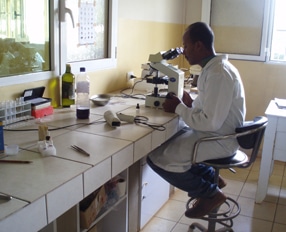 MC: Yes, it is a totally different sector. FPSC has been working since some time ago in Ethiopia and its working strategy deals with environmental, health and education issues.
MC: Yes, it is a totally different sector. FPSC has been working since some time ago in Ethiopia and its working strategy deals with environmental, health and education issues.
FPSC started by working in health matters in Ethiopia; it built a San Gabriel Health Care Centre, located on a quite poor district of Ethiopia, to the south, Akaki Kality, providing a solution to a large percentage of the population that doesn’t have resources. Health sector in Ethiopia is quite poor. In recent times, the government has launched the construction of new centres, trying to cover a larger part of the population.
One of the challenges it confronts is the sanitary staff isn’t still properly trained. The main goal of our project is the strengthening of the abilities of the medical staff in the San Gabriel Health Care Centre, dealing with the training in topics such as analysis, lab, pharmacy, management or patient care. The objective is to improve the procedure, not just the sanitary one, but also the management of the health care centre. For example, the idea is to change from a manual registration to an electronic one, from where being able to access the patient’s record, and not just the one in San Gabriel Health Care Centre, but also in the other 10 health care centres providing service to the community of Akaki Kality. In that sense, there’s an agreement with the Ministry of Health. The project totally matches the government policies.
The idea is to make it start in March, being its duration 2 years and continuing the work of FPSC and its specific compromise with this centre.

